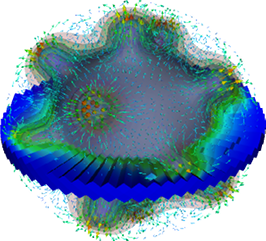Free Probability and Operators
[an error occurred while processing this directive]
| |
Date
Time |
Location | Speaker |
Title – click for abstract |
 |
03/22
4:00pm |
BLOC 304 |
Ken Dykema
TAMU |
On operator-valued R-diagonal and Haar unitary elements (Joint work with John Griffin)
R-diagonal elements are naturally defined by conditions on
the free cumulants of the pair consisting of the element and its
adjoint. In the tracial, scalar-valued context, it is known (due to
pioneering work of Nica and Speicher) that being R-diagonal is
equivalent to having the same *-distribution as an element with a polar
decomposition z=u|z|, where u and |z| are *-free and where u is a Haar
unitary. In the operator-valued context (namely, B-valued where B is an
operator algebra), this is no longer the case. Freeness need not occur,
and even notions of Haar unitary are more complicated in the
operator-valued setting. We will (1) examine different notions of
operator-valued Haar unitary (2) introduce the notion of a free bipolar
decomposition and (3) discuss a specific result about free bipolar
decompositions of B-valued circular elements (which are a very special
case of B-valued R-diagonal elements) when B is two-dimensional. |
[an error occurred while processing this directive]



